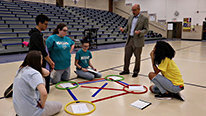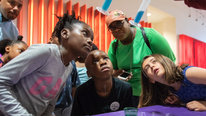Expanding STEM to INCLUDE the Bottom Quartile of the Nation's K12 Graders Thr...
NSF Awards: 1649342
2018 (see original presentation & discussion)
Grades K-6, Grades 6-8, Grades 9-12, Informal / multi-age
Drawing on the energy generated in two national convenings, supported by the NSF INCLUDES program, for a "We the People - Math Literacy for All" Alliance in 2017, we continue to push forward to develop local, regional and national structured opportunities that enable K-12 students performing in the lowest quartile (on state standardized exams) in mathematics to graduate high school on time ready for college or career math without remediation. This video highlights the emergent voices and work of students and teachers within the Alliance, which, in collaboration with school leaders, community members, researchers and policy makers, are informing the development of this "Alliance of Alliances." This “We The People” Alliance also calls on the Nation to activate the National Citizenship clause of the 14th Amendment to ensure Quality Public School education to elevate bottom quartile math literacy onto a 21st century platform.
Related Content for "We the People - Math Literacy for All" an emerging Alliance
-
 2019Concept of Function Learning Progression
2019Concept of Function Learning Progression
Edith Graf
-
 2017We The People - Math Literacy for All
2017We The People - Math Literacy for All
Marcus Hung
-
 2017Teaching and Learning Math with PhET Simulations
2017Teaching and Learning Math with PhET Simulations
Kathy Perkins
-
 2021COVID Connects Us: A Culture-Setting Collaboration and Unit
2021COVID Connects Us: A Culture-Setting Collaboration and Unit
April Luehmann
-
 2021Supporting Equitable Participation and Access
2021Supporting Equitable Participation and Access
Jonee Wilson
-
 2022Developing, Enacting, Researching Anti-bias Math Education
2022Developing, Enacting, Researching Anti-bias Math Education
Eva Thanheiser
-
 2021Inclusion and Math Class
2021Inclusion and Math Class
Nathanial Brown
-
 2017New Strategies for Ethical and Equitable Research
2017New Strategies for Ethical and Equitable Research
Bronwyn Bevan

Marcus Hung
Math Teacher and Filmmaker
Welcome to the discussion! If you haven't heard of the "We the People" - Math Literacy for All alliance please take a moment to check out some other videos that highlight the heart and voice of those who are on the ground level working to make change across the country.
"We the People" Playlist
"We the People" Student Voice
"We the People" Teacher Voice
"We the People" Community Voice
"We the People" School Leader Voice
Looking forward to hearing from you on how this work can be expanded and supported throughout our country.
-Marcus
Shabnam Brady
Math is a critical part of everyday life. I love this project and the unity it conveys through its themes of incorporating math. What aspects of culture within education are currently part of the project's scope? What parts of this scope are supported by the literature?
Great work!
Marcus Hung
Math Teacher and Filmmaker
Hi Shabnam! Thanks for your comment.. I'm not sure I completely understand what you mean by "aspects of culture"... if you have a moment to check out any of our Voice videos that would help to give a fuller sense of what we are aiming to address through this alliance. Thank you!
Danielle Watt
Director of Education, Outreach, & Diversity
What a great project and I love and appreciate the links to the "voices" from each perspective! I know it's early in your project but what impact do you see with student's performance after participating in the program for a year? How are you evaluating the impact in the classroom of students who participate with teachers not engaged in the program?
Marcus Hung
Math Teacher and Filmmaker
Hi Danielle! Thanks for your comment-- glad you appreciated the links. The impact that we see in students, teachers, schools, communities reach far beyond test scores. Classroom communities throughout the alliance are stepping up to bring change to the traditionally unchallenged and ineffective models of math (and STEM) education. We see this through the math literacy work that students themselves are actively engaged in (see The Young People's Project for more information) as well as the renewed sense of community and purpose in education from teachers and students alike. We look forward to more documentation and evaluation to measure the effectiveness of this work in the years to come. Thank you!
Danielle Watt
Danielle Watt
Director of Education, Outreach, & Diversity
Hello Marcus, thanks for the YPP link! It's great to see students engage peers and others by serving as math literacy workers.
Marcus Hung
Math Teacher and Filmmaker
You're welcome Danielle! Here's a video that captures the work of YPP as they are building a national tournament structure to play a math-centered physical game called Flagway that was developed through the work of young people in YPP and The Algebra Project. This took place in 2017 at the National Math Festival in Washington, D.C. and hopefully will returning again to the NMF in 2019.
Whitney Erby
Doctoral Student
Great video! You talk about changing the culture of education and getting kids more engaged in mathematics. What are some ways you have gone about getting students more interested and engaged in math? What have been some of the major challenges you have faced?
Marcus Hung
Math Teacher and Filmmaker
Thanks Whitney! There are various approaches to change that the work of alliance is considering.
Within the classroom and the current educational system in general, we are working to create change through curriculum/pedagogy shifts, engaging students in math literacy work after school, engaging teachers in the rethinking/design of quality math instruction, as well as other ways.
Outside of the classroom, we are working primarily through community organizing and helping communities to see the value of math literacy as well as fighting against the school/societal structures that keep our most marginalized students from receiving a quality education.
The biggest challenge that is facing all of this work (even beyond the scope of the "We the People" alliance and all STEM focused efforts that are particularly aimed to raise the floor within our country) is the systemic forms of oppression that currently impede our very best efforts as well-intentioned educators in the current educational landscape. The system is broken and the biggest challenge to fixing it is understanding the need to work toward a new solution. Would love to hear your thoughts on this-- thanks!
Danielle Watt
Whitney Erby
Doctoral Student
Hi Marcus!
I agree with you whole heartedly. I think that oppression, inequality, and racism are all major obstacles to raising the floor and until we make systemic changes, problems will always exist. I also think that programs like We the People are a great way to make progress on a more micro and local level until broader change occurs. I admire your work and your approach!
Jay Labov
Thank you so much for producing and posting this video, along with links to all of the others that are part of your work. As you've categorized them, they point to what I think are two very important insights: 1) that addressing these issues of improving math literacy is a systems problem. There is no one magic bullet. and 2) that literacy in mathematics, as in all other areas of education, is empowering to those who acquire it. I think that emphasizing this point by having students recite and showing the Preamble to the Constitution is highly effective.
It's also clear from the number of comments thus far that your approach is generating much interest in in this community. Congratulations!
Marcus Hung
Math Teacher and Filmmaker
Appreciate your comments Jay! I love the insights that you came away with and I think you are right on.
The alliance is based on many decades of work on behalf of many (including but certainly not limited to Bob Moses and the Algebra Project) who have been approaching this systems issue from a variety of ways and drawing on multiple constituencies to bring about a real solution to building math literacy for our most marginalized students in our country. For example, teachers, school/district administrators, university partners, community organizers, other educational organizations, and last but not least young people themselves have been taking up the question of whether we are going to truly be a "We the People"-- fighting for all people to truly live free and be all that we can be.
We are standing upon the belief that in order to change the system that is failing so many of our students we need to engage the whole system and approach it from more than just an inside-out classroom/teaching standpoint and rather take on an outside-in or rather as Bob Moses puts it a "bottom-up" approach. Would love to hear your thoughts on this-- thanks!
Jay Labov
I couldn't agree with you more! Much has been written in a variety of fields about how to achieve organizational and systems change, for example in business and in higher education. Some of those sources may provide some additional evidence-based approaches to what seems to work in moving a system off-center and in a different direction. I congratulate you and your colleagues on this very important initiative!
Jay
Marcus Hung
Math Teacher and Filmmaker
Right on thanks Jay! Any particular sources you're familiar with or could recommend? Thank you!
William Swift
Beautiful video and project Marcus. It seems like you have a great program working. Something that really shaped my math experience in school was a teacher who felt it was an unfair advantage over the other students that we had him as our teacher, and he graded us accordingly, discounting our grades where were in a test that everyone had to take in our grade and emphasizing our grades in for our in class work where we were "competing" against ourselves.
The crazy thing was that he was right. Mr. Wales could teach math in a way that it just made sense to you, and I mean pretty much everyone in his class. I had never experienced the level of clarity and understanding of math, even complex math, that he could convey. How do we create that next generation of Math Teachers, who can foster that love of mathematics. It really takes a level of excellence to be able to make math come alive for students.
Great to see your project is working on that issue and fostering a love of math in our young students.
Marcus Hung
Math Teacher and Filmmaker
Thank you William! What I hear in your story that I hear in so many of my friends/families/colleagues stories is that the system of education didn't change you but rather the educators who were passionate about what they do and who they serve really made a lasting impact and difference in your life. The "We the People" Alliance is working to bring the focus back onto the people and to see what we can collectively do when we focus on creating change together and hopefully affect the system to produce more teachers who are free to teach so that students are free to learn-- truly striving for a system that makes STEM for All a reality.
I also hear that you appreciated Mr. Wales for his critical practice and pedagogy where the level of intention and thoughtfulness behind his grading and instruction meant so much to you and your learning. As educators and supporters of educators, we have to be so much more critical of our practice and pedagogy-- simply doing the level of thoughtful work that we ask of students each and every day.
STEM For All is a nice idea but unless we who are in power take a deep look in the mirror about the work that we do and for whom it most benefits, we cannot truly realize a world where STEM is truly for All. Would love to hear your follow up comments/thoughts on this William- thank you for sharing your story!
Further posting is closed as the event has ended.